Part One: History, Communication, Media & Film, Sociology & Criminology, and introducing Interdisciplinary & Critical Studies
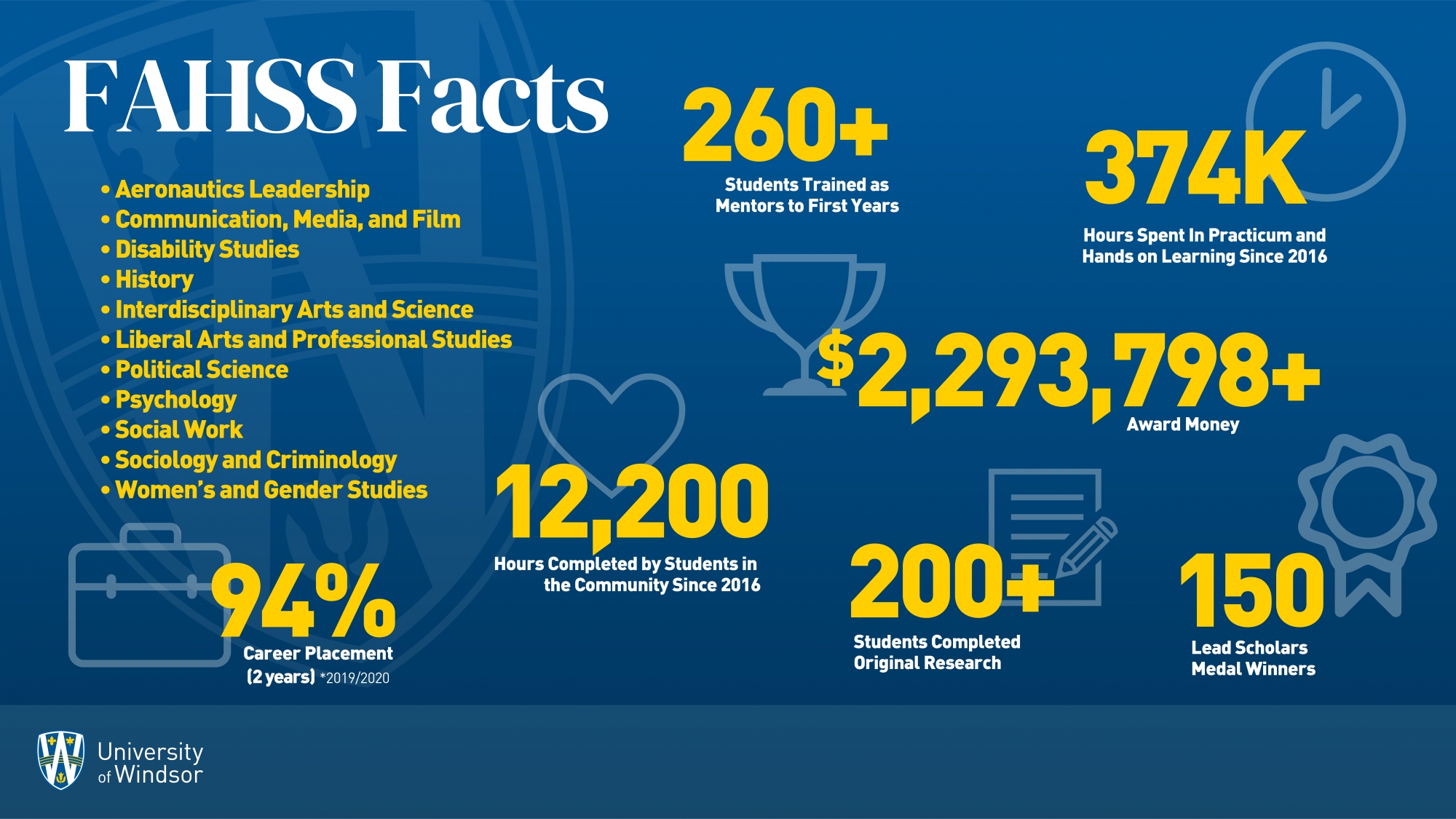
Message from Dr. Cheryl Collier, Dean
 Welcome to the third edition of our Faculty newsletter The FAHSS View!
Welcome to the third edition of our Faculty newsletter The FAHSS View!
In volume three, we begin to highlight activity and programming in one of the largest academic areas in FAHSS – the Social Sciences and Professional Studies. Here we share stories and news from four of our departments including History, Sociology and Criminology, Communication Media and Film, as well as our newest department Interdisciplinary and Critical Studies – or IaCS for short! IaCS is the home to existing critical and area studies programs including Women’s and Gender Studies, Disability Studies, Liberal Arts and Professional Studies, and will be the future home of our forthcoming Black Studies program. We are excited to launch this important teaching, research, and learning space in FAHSS and encourage you to watch for the exciting events and announcements from IaCS in the months and years to come!
We also are so very pleased to announce the launch of Co-operative Education program streams in ten programs in FAHSS across not only the Social Sciences, but also in the Humanities and Arts (see the full listing in the story below). Students in these co-op streams will be able to gain paid work experience during three co-op terms over the course of their honours degree programs. These accredited co-op placements will serve as an important training ground where students will get to apply the skills and competencies they learn in the classroom in real world employment spaces. We know that co-op will be popular with our incoming FAHSS students and look forward to working with our employment partners in Windsor-Essex and beyond via our Co-operative Education and Workplace Partnerships office to connect our FAHSS students more fully to the community and prepare them for their careers after graduation.
I hope you enjoy reading the news from the Social Sciences and Professional Studies, Part One. Look for Part Two to arrive in your inbox very soon!
Have a safe and productive summer!
Dr. Cheryl Collier.
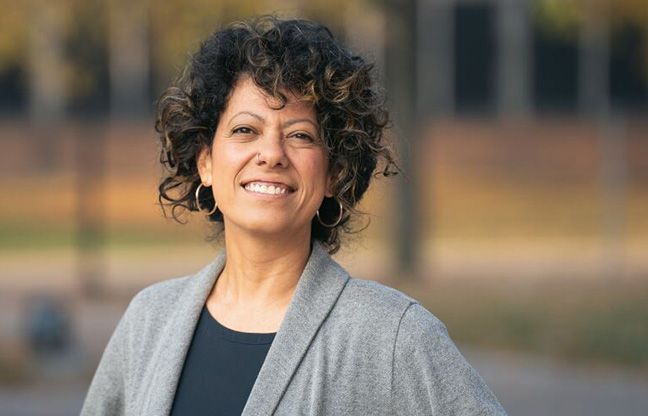 Introducing the new Interdisciplinary and Critical Studies department
Introducing the new Interdisciplinary and Critical Studies department
Introducing Co-op Programs in FAHSS 
Ten new co-op streams in the arts, humanities, and social sciences are now available to students looking to gain hands-on work experience and a competitive edge upon graduation.
Launched in collaboration with Co-operative Education and Workplace Partnerships and the Faculty of Arts, Humanities, and Social Sciences, the new co-op offerings span a variety of disciplines and fields of study, including:
- Communication, Media, and Film
- Drama
- Drama in Education and Community with a Concentration in Applied Theatre
- English
- French
- History
- Modern Languages and Second Language Education (Spanish Stream)
- Philosophy
- Political Science
- Psychology
Enrolment details:
- The inaugural cohort of FAHSS co-op students will be selected from students entering the Fall 2023 intake this September from the eligible Honours Bachelor of Arts disciplines.
- Applications for eligible students open Friday, Dec. 1, and close Monday, Jan. 8, at 4 p.m. Those students will be invited to in-person and virtual information sessions to learn more about how co-op could compliment their degree program.
- After the first intake of FAHSS co-op students, this option will be available from high school (Fall 2024 admissions).
Kristen Morris, manager of co-operative education and workplace partnerships, says the co-op office is excited to build on the success of existing UWindsor co-op and internship programs by offering more students the opportunity to put their skills to work in a variety of sectors.
“With these additional co-op streams, students will be able to explore their career options, build professional connections, and earn 12 months of paid work experience while applying and enhancing their skills,” says Morris.
Cheryl Collier, dean of the Faculty of Arts, Humanities, and Social Sciences, says she is excited to be able to offer students co-operative education opportunities in many core programs.
We already know that the skills students develop in our programs are essential to the jobs of the future,” Dr. Collier says. “They will now get the opportunity to apply these skills during their university education which will give them an even stronger advantage and head start toward their careers upon graduation.”
For more information about the new FAHSS co-op options, visit uwindsor.ca/coop.
Sociology & Criminology
 Sociology and criminology prof to lead University’s Research Ethics Board
Sociology and criminology prof to lead University’s Research Ethics Board
Sociology and Criminology professor Suzanne McMurphy has accepted appointment as Chair of the University of Windsor’s Research Ethics Board effective July 1, 2023 the Office of the Vice-President, Research and Innovation announced.
“I am very pleased that Dr. McMurphy has taken on this role”, said Interim Vice-President, Research and Innovation, Chris Houser. “Dr. McMurphy’s exceptional leadership, dedication, wealth of knowledge, and expertise in research ethics are a tremendous asset to our research community.”
Dr. McMurphy has over 20 years’ experience in research ethics, serving as a member of institutional review boards in the US and research ethics boards in Canada. She joined the University of Windsor’s Research Ethics Board in 2010, serving as Chair from 2016-2022. She has also been a member of the Windsor Regional Hospital’s Research Ethics Board since 2017. From 2021-2023, Dr. McMurphy provided consultation to the World Health Organization’s Secretariat for the Ethics Review Committee where, in addition to providing pre-reviews and assessments of international research ethics protocols, she developed and staffed a weekly clinic on research ethics for WHO personnel. She is a member of the Consortium to Advance Effective Research Ethics Oversight, located at the University of Pennsylvania, and a collaborating researcher on two of their research projects examining the improvement of research ethics protocols and developing metrics to assess the quality of research ethics oversight. During her recent sabbatical, Dr. McMurphy completed a Master’s in Bioethics (MHSc) at the University of Toronto. She is currently working on a co-edited book on contemporary research ethics issues and qualitative research.
In addition to serving as Chair of the Research Ethics Board, Dr. McMurphy teaches research methods, qualitative research and law and social policy in her home Department of Sociology and Criminology. Her research examines issues of institutional trust and trustworthiness and she is a founding member of the Trustworthiness Research Alliance at the University of Windsor.
Dr. McMurphy succeeds Scott Martyn, who served as the Board’s Chair since 2022.
“On behalf of our research community, I would like to thank Dr. Martyn for his service over the past year,” Dr. Houser said.

History
Internship pairs history students with museum
The best collaborations are born out of a mutual need and opportunity.
Last fall, history professor Gregg French established the Local Black History Internship Program between the Department of History and the Amherstburg Freedom Museum. Early this year, they received a Mitacs Accelerate Program grant to support this initiative.
The museum’s assistant curator, Lorene Bridgen-Lennie, said she and Dr. French thought it would be interesting to have interns highlight the museum’s family history series.
“Each month, I research and write about a local Black Canadian family in Essex County which is shared on our website,” Dr. Bridgen-Lennie said. “The intern is adding to the family history series by conducting further research and mapping out the settlement of these families during the 19th century which is not something I have seen applied to Essex County to this extent before. The research is an extension of the family history series which adds to the Amherstburg Freedom Museum’s collection.”
French says the position is meant to give the interns a chance to use their knowledge: “We want to provide students with an experiential learning experience which will enable them to take those skills that they’re learning inside the classroom and apply them in a practical way in the field.”
Undergraduate history students were invited to apply for the internship, and Karleigh Kochaniec was hired. Kochaniec graduated in May with a BA in history and women’s and gender studies, with distinction.
The internship is divided into two sections. The first portion occurred during the winter semester and involved conducting approximately 10 hours per week of secondary research. This researched enabled Kochaniec to immerse herself in the field of study and prepared her for forthcoming archival research.
Starting on May 1, the internship transitioned to the Amherstburg Freedom Museum, where Kochaniec is currently conducting archival research and preparing a permanent exhibit for the museum. Read more ...
Sociology & Criminology
 Exploration of social factors in suicide ideation wins recognition for sociology scholars
Exploration of social factors in suicide ideation wins recognition for sociology scholars
Regular social interaction can help prevent suicidal thoughts, say two UWindsor sociology professors.
“There is a widespread consensus that suicide and the prevalence of thoughts about suicide in the population are worrisome problems in Canadian society,” Ronjon Paul Datta and Reza Nakhaie write in an article published in the Canadian Review of Sociology. “This makes suicide and suicidal ideation a pathological social fact characterized by its generality throughout society, one that cannot be reduced to individual psychopathology.”
Using publicly available survey data, the authors explore whether social support and a sense of belonging — factors often conflated — affect suicide ideation differently. Their findings? A higher level of social support had the largest effect, while that of a sense of belonging disappeared once measures of social support are accounted for.
In addition, they showed that immigrants, racialized, and food-insecure Canadians were significantly more prone to suicidal ideations than their counterparts. However, higher social support among the former groups helped decrease their level of suicidal ideation. Drs. Datta and Nakhaie stressed that policy makers must grasp that socially healthy and vibrant citizenship depends on social support, particularly among immigrants, racialized, and food-insecure Canadians.
Their analysis won recognition from the Canadian Sociological Association, which conferred its 2023 award for best journal article on their study, “Suicidal ideation and social integration in three Canadian provinces: The importance of social support and community belonging.”
In a citation, the awards committee wrote it was “especially impressed by the theoretical foundations of this study as well as its potential to appeal to a broad, interdisciplinary audience. It succeeds in reinforcing the value of sociological scholarship and sociology as a discipline by drawing from foundations, applied to contemporary social problems.”
Criminology
Juliana Wiggins, Psychology & Criminology
 Recruitment
Recruitment
Summer camp promises magical experience
Don’t be alarmed should you happen to notice some young aspiring witches and wizards on campus. FAHSS is running a Harry Potter themed summer camp for children aged 7 to 12 during July and August.
The magical adventure, organized in partnership with Lancer Summer Camps, promises an experience filled with creativity, friendship, and the joy of exploring magic, wonder, and imagination through a range of disciplines. Whether they’re budding actors, talented painters, passionate writers, or creative dreamers, there’s something extraordinary waiting for campers at FAHSS Academy.
Students will strengthen their Hogwarts application through such activities and workshops as: 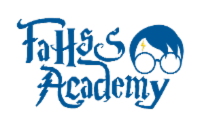
- Drama — Go behind the scenes and create a magic wand in the prop shop, design a button for your wizard cape in the costume shop, and enjoy drama games on a real theatre stage.
- Visual arts — Create wizard-inspired masterpieces using varied media, painting, drawing, and colouring.
- Creative writing — Explore the realm of magical storytelling and embark on your own literary adventures. Write and create a potion that you will take home to the muggle world with you.
- Music — Let the rhythm and melodies of the wizarding world guide your footsteps. You will become the conductor and your wand will tap along to the music.
- Film — See how Harry Potter was created through images on a green screen, be inspired in a real studio space filled with cameras, lights, and action.
- Quidditch — Experience the thrill of the most beloved sport in the wizarding world.
The faculty’s recruitment and outreach co-ordinator, Sheri Lowrie, says she is excited to welcome young Potter enthusiasts.
“Through a fusion of arts and the magic of the wizarding world, this camp will ignite the spark of inspiration within every camper, leaving them with lifelong memories and a renewed passion for the arts,” she says. “Let the journey begin, and the magic of creativity guide us all.”
July 3 - 7 saw the first of two offerings this summer. The second week runs Aug. 21 to 25. Both weeks sold out!
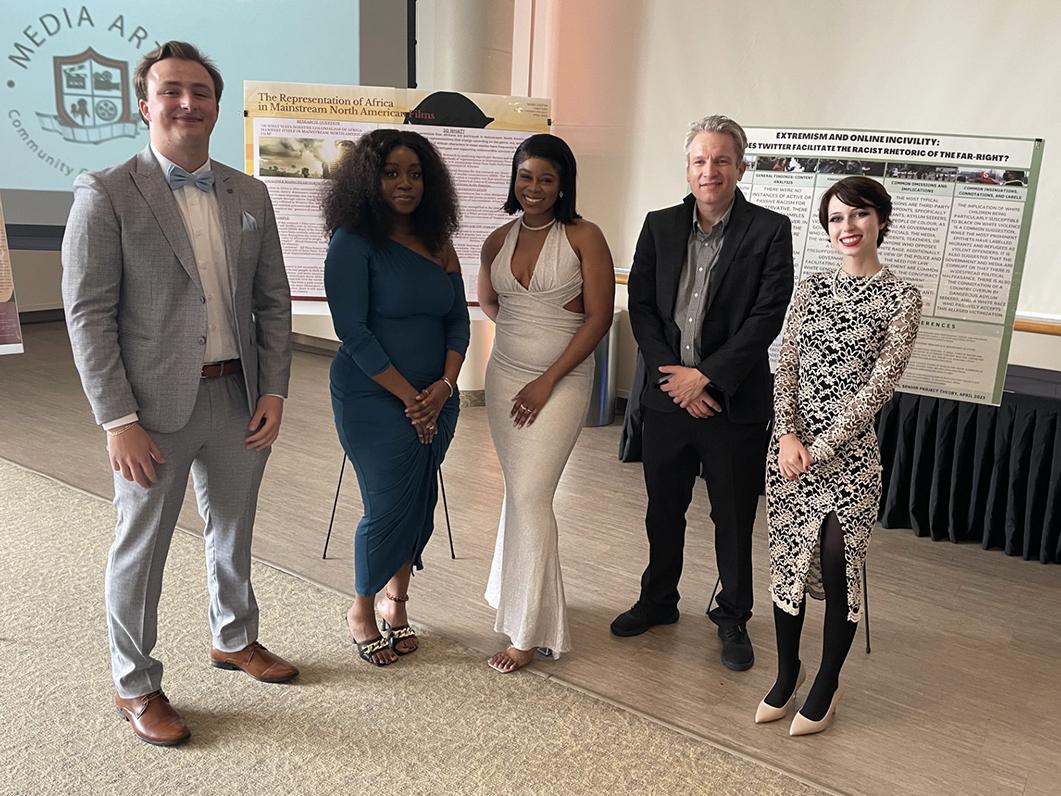 Communication, Media & Film
Communication, Media & Film
CMF Capstone Senior Project Returns
Many programs in the Faculty of Arts, Humanities and Social Sciences (FAHSS) offer their students “capstone courses” where 4th year students can focus on the various elements of one project over two semesters. Examples include English & Creative Writing’s Editing and Publishing Practicum, Interdisciplinary Arts & Science’s Research Project, and more recently, Communication, Media & Film’s (CMF) Theory Senior Project I: Research Design, and Theory Senior Project II: Writing and Presentation.
Susan Bryant, PhD taught both semesters of the theory capstone courses in 2022/23.
“In the fall course students do a refresher of the research methods that they should already know. And then they start developing a research question (in the case of primary research) or a research focus and argument (in the case of secondary research),” says Dr. Bryant. “By the winter break, they have completed and presented a proposal related to our discipline.”
Students aren’t required to take both semesters of the senior project. By December, they’ve developed their research methods knowledge, worked on a preliminary research plan, and gained proposal writing skills. They can complete the fall semester and do something different during the winter term or continue with the writing and presentation course.
In the second course, students build on the design they created in their proposal by enhancing their research plan and strengthening their literature review right away in the new year. Then they start working on their research.
In addition to writing a 25-30-page research paper, the students are required to distill their research work and present it on a large poster; this year the students chose the 4’ x 3’ format. The idea is that the students develop the skills involved in taking a large piece of work and summarizing it effectively in a very concise format.
“After going through a small-group seminar like this over the course of two semesters, the students knew each other’s work pretty well,” says Dr. Bryant. “This meant that they could really collaborate and contribute to editing and honing each other’s posters. It was an excellent seminar experience for them to be able to work together like this; I found it really rewarding to see.”
In April, the Communication Students Association put on a gala at the St. Clair Centre for the Arts. As part of the celebration, Dr. Bryant’s students had the opportunity to display their posters and discuss their research in a casual forum before dinner. Moreover, two of students from the course will enter the MA, Communication and Social Justice program this fall.
Examples of students’ research topics:
- ESPN’s representations of athletes who have been accused of domestic violence, with a specific examination of racial differences in the athletes’ portrayals.
- Alt-right discourses in online news via a critical analysis of Jordan Peterson’s messaging and transition to and use of The Daily Wire.
- The alt-right’s use of Twitter with a focus on the use of hate speech and on a particular vocabulary promoting hatred.
- Two students’ work was more theoretical and based mainly on secondary research with illustrative examples from film. They were interested in different takes on race and representation. One student examined the issue of colorism and the ways in which dark-skinned versus light-skinned black women are represented. The other student analyzed problematic misrepresentations of African culture in Hollywood and Netflix films.
Photo: Left to right: Jared Hewitt, Mabel Usifoh, Dami Adekogbe, Andrew Folkes, and Jocelyn Martin.
Communication, Media & Film Professor Honoured
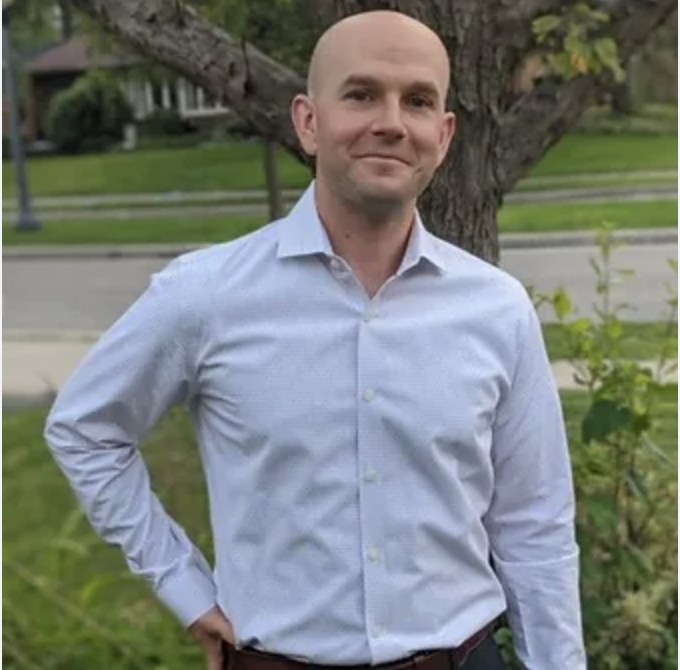 Dr. Vincent Manzerolle received the Organization of Part-time University Students (OPUS) 2022 Faculty Award. This is a notable campus-wide award, and the ceremony was back in the fall.
Dr. Vincent Manzerolle received the Organization of Part-time University Students (OPUS) 2022 Faculty Award. This is a notable campus-wide award, and the ceremony was back in the fall.
 News from Advancement
News from Advancement
There Are Many Ways to Support Students
Awards from the Michael J. Petro Endowment for Film Innovation were distributed to students for the first time in the 2023 Winter Term. Ten (10) students enrolled in Film 4100 each received a gift from Mr. Petro’s endowment that they applied toward the completion of a project necessary to satisfy degree requirements. Well done, students! And congratulations on completing your course of study!
Donors can create awards to support students in various ways.
To learn more about how you can help UWindsor students fulfill their academic goals, please contact Camille L. Armour, Senior Development Officer in the Faculty of Arts, Humanities and Social Sciences (FAHSS), at c.armour@uwindsor.ca or 519-818-7661.
Help us spread the word!
If you like our newsletter, please consider forwarding this email to a friend and ask them to sign up to receive it in their inbox.
Arts, Humanities & Social Sciences hosts many concerts, recitals, exhibitions, screenings, workshops, and guest lectures throughout the school year. Sign up to receive our occasional event emails about all the events happening!

